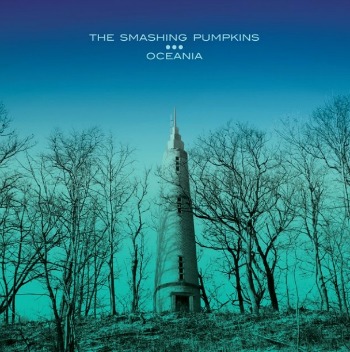Billy Corgan Finally Finds Balance On New Smashing Pumpkins Album Oceania
By Tankboy in Arts & Entertainment on Jun 21, 2012 6:00PM
What's immediately most surprising about Oceania, the first new album from Billy Corgan's latest incarnation of the Smashing Pumpkins, is that it's a cohesive piece of work. And then one realizes that it's surprisingly fun to listen to, as well. And then you realize that Oceania is easily the best record the Smashing Pumpkins have put out since their heyday.
One reason for this is simple: Corgan's group sounds like they did back then. But there's something more subtle at work. The raging rat in a cage mentality seems to have been brought under control, though it hasn't entirely dissipated. The result is there's a new space to the songs that makes this the clearest sounding Smashing Pumpkins record ever.
The album opens with "Quasar," a sonic nod of nostalgia which, intentionally or not, basically meshes together the opening vibe of both Gish's "I Am One" and Siamese Dream's "Cherub Rock" in its first measures before turning into a relentless rush of drums and sharp turning guitars. Corgan's voice cuts through it all and carries a new confidence, which in turn allows him to take control and deliver vocals that veer towards triumph ad away from angst. Corgan's still got that weird mix between between tenor and falsetto he's always employed, but the Whiny Billy that's made that difficult to listen to in the past seems to have been banished. Corgan may still be a public curmudgeon but here there's a new positivity that works in his favor.
 As the disc progresses and the guitars stay turned up, they veer from what's been a tuneless angry wall in recent years and knocked it knocked down to re-embrace melody on songs like "Panopticon," "The Chimera" and, surprisingly, even the nine-minute title track. The quieter forays are mostly just as satisfying and seeing Corgan wandering happily from something like the reflective "Pinwheels" to the Townsend-ian synths sharply burbling underneath "One Diamond, One Heart."
As the disc progresses and the guitars stay turned up, they veer from what's been a tuneless angry wall in recent years and knocked it knocked down to re-embrace melody on songs like "Panopticon," "The Chimera" and, surprisingly, even the nine-minute title track. The quieter forays are mostly just as satisfying and seeing Corgan wandering happily from something like the reflective "Pinwheels" to the Townsend-ian synths sharply burbling underneath "One Diamond, One Heart."
There's a hippy-dippy happiness running throughout the album that makes itself apparent in Corgan's lyrical choices—the lines in "My Love Is Winter" include a reference to Sister Moon and the intonation "my love is love"—are not dissimilar to much of the album's verse. And this isn't meant negatively. Corgan's always been better when he's reaching for the celestial, and while that can seem silly at times, it also allows him to do his best work unfettered by fear of embarrassment. In the recent past that could come off as screed-ish, but back when Corgan formed the Pumpkins that was one of the things that set them apart from the crowd and made them great.
On Oceania Billy Corgan finally learns that it does him no good to be angry that the world no longer loves him, so he's just decided to love the world. And, oddly, that brings out the best in him.
